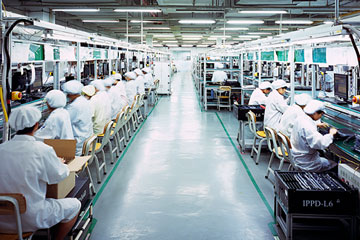
A Foxconn plant in Shenzhen, which puts together, among other products, the iPhone.
(4 of 4)
Zhou Chengjian, founder of Shanghai-based apparel retailer Meters/bonwe, is trying to learn from his compatriots' mistakes. The former tailor has constructed a retailing empire in China of about 5,000 stores selling casual jeans and shirts. But even though he has taken stabs at introducing his brand to a global audience — placing a Meters/bonwe T-shirt on Shia LaBeouf's character in the last Transformers movie — he hasn't rushed to expand outside the country. The reason, he says, is that his brand isn't strong enough yet. "Having money and being audacious doesn't make you ready to compete in the international market," Zhou says. He is experimenting now with refashioning his brand from simply a label on basic clothes to a name that encapsulates a lifestyle steeped in Chinese tradition. To promote the new image, Meters/bonwe is launching a chain of redesigned flagship stores around the country — one, in Hangzhou, has been crafted to look like an old Chinese train station. After honing the concept in China, Zhou plans to go global, opening stores in New York City, London and Tokyo over the next three years. "By combining a Chinese way of life with international methods, we can be unique and competitive," he says.
That will be a tall order. Even at home, Meters/bonwe and other Chinese retailers are being seriously tested in major cities by rapidly expanding foreign competitors like Zara, H&M and Uniqlo. Says Zhou: "Chinese people look up to the international brands because they think they are better than the local brands."
GOOD MANAGERS ARE HARD TO FIND.
Fixing all these problems will take some nimble corporate management. Though there are some exceptional entrepreneurs and executives in China, finding talent to fill the needs of all the rapidly expanding businesses in the country has become a major headache. A recent survey conducted by the European Chamber of Commerce in China found that the scarcity of qualified workers is the No. 1 human-resource challenge facing its members. Those few who are qualified can command juicy paychecks. The median salary for an upper-middle manager in Beijing rose to over $105,000 in 2012, already more than two-thirds the level in the U.S., according to Mercer.
The dearth of capable managers, says Bob Boyce, CEO of Shanghai-based Blue Horizon Hospitality Group, "is the biggest thing holding our business back." Since almost none of his 800 employees had relevant experience when joining the restaurant chain, Boyce has had to train his managers from scratch, intensively immersing promising staffers in different aspects of the business and carefully moving them up into more senior positions. Some, he says, turn into top-notch managers. But he has to implement measures that probably wouldn't be necessary in the U.S. Responsibilities are broken up into narrowly defined slivers among numerous managers — one monitors the kitchen, another oversees the waiters, yet another the facilities. Boyce has designed detailed checklists and procedures on everything from how a waiter should interact with customers to personal hygiene to food preparation, all carefully monitored by a general manager. To compensate for such green management, Boyce staffs his restaurants with some 30% more people than a similar one in the U.S. "Without proper managers, everything has to be overengineered," Boyce says.
Despite these challenges, don't count China out. It has routinely silenced naysayers and defied gloom-and-doom predictions. The economy, even amid a current slowdown, remains enviably robust, expanding by 7.8% in the third quarter. And a major slate of reforms may be unveiled at a Communist Party plenum in November. Yet transforming a fractious, developing country of such gargantuan size into an economically advanced nation has simply never been done before. "You've got 50 years of business innovation in the U.S. trying to happen here in 10 years," says GGV's Richards. That may be too much to ask of any country, even China.
— with reporting by Chengcheng Jiang / Beijing
